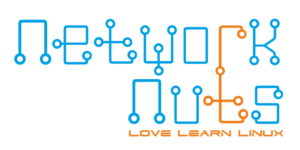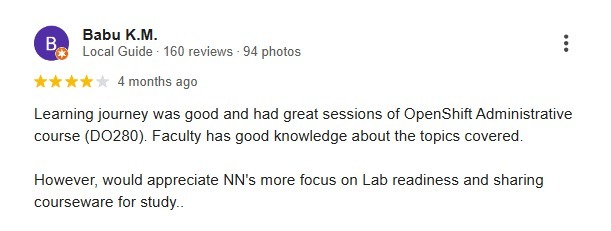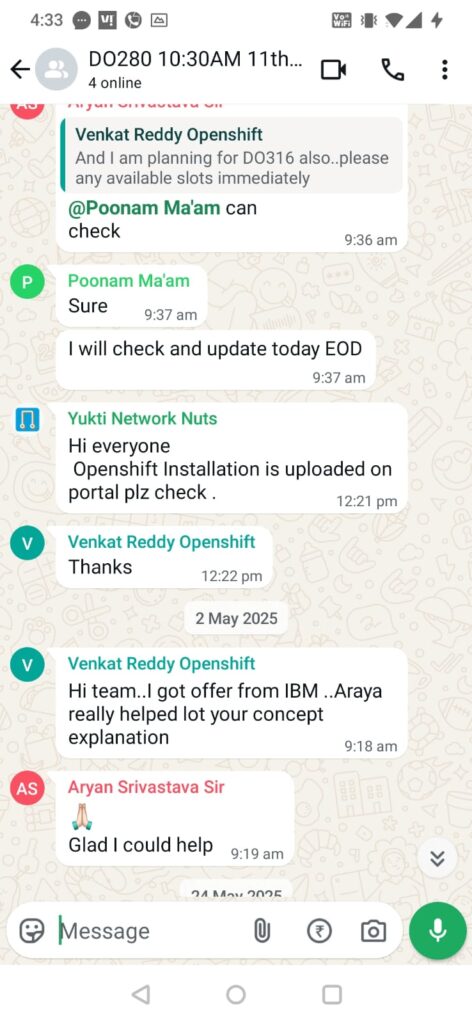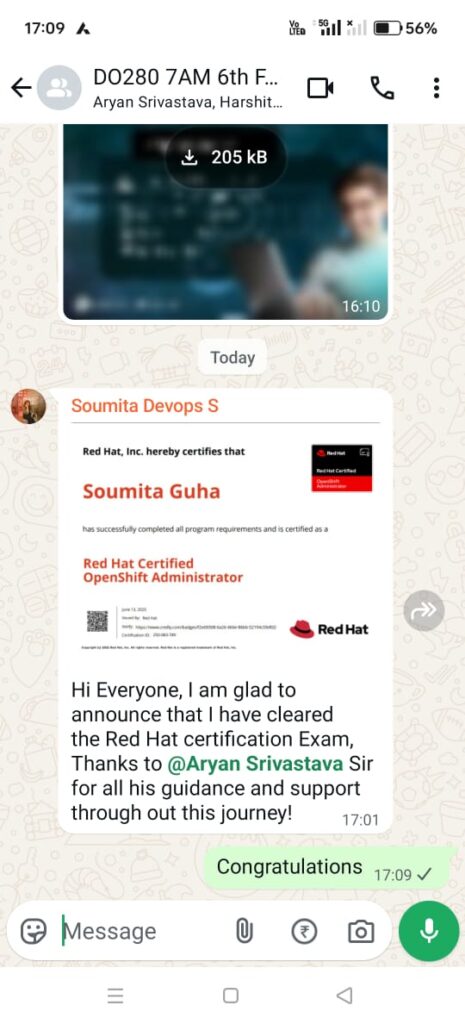
Red Hat Openshift Live Training & Certification

DO188- RED HAT OPENSHIFT DEVELOPMENT I: INTRODUCTION TO CONTAINERS WITH PODMAN
DO280-RED HAT OPENSHIFT ADMINISTRATION II: CONFIGURING A PRODUCTION CLUSTER
DO380-RED HAT OPENSHIFT ADMINISTRATION III: SCALING DEPLOYMENTS IN THE ENTERPRISE
DO316 - MANAGING VIRTUAL MACHINES WITH RED HAT OPENSHIFT VIRTUALIZATIONS
Trial Sessions
DO188 Openshift Training.
DO280 Openshift Training
Upcoming Schedules
Schedule 1
OpenShift Development I : Introduction to containers with Podman (DO188)
Time: 02:45 PM -04:15 PM IST
05:15 AM – 06:45 AM EST
Days: Saturday – Sunday
Mode: Online
Starting Date: 16th Aug 2025
Schedule 2
OpenShift Development I : Introduction to containers with Podman (DO188)
Time: 07:00 AM – 08:00 AM IST
09:30 PM- 10:30 PM EST
Days: Monday to Thursday
Mode: Online
Starting Date: 25th Aug 2025
Schedule 3
OpenShift Administration II : Configuring a Production Cluster (DO280)
Time: 08:00 AM -09:00 AM IST
10:30 PM- 11:30 PM EST
Days: Monday – Thursday
Mode: Online
Starting Date: 18th Aug 2025
Google Reviews




LinkedIn Achievements




WhatsApp Achievements




Frequently asked questions
Is this training live or pre-recorded?
The training is live instructor led training which is available in classroom as well as online format. We also record every training session which is then uploaded to our student portal.
How will I join the live online training?
The live online training is conducted via the zoom software, we will be providing you with the zoom meeting link to join the training.
How many students are there in a single batch?
On an average one batch will have a maximum of 18 students. We keep smaller batch sizes to promote interaction between the students and the instructor.
How can I practice the labs?
We will provide you with online labs. If needed, we can also provide you with the software required to create your own labs.
Do you offer payment flexibility?
Yes, we provide zero interest EMI options.
Can I attend the training in classroom?
Yes, our classroom training location is in New Delhi near Lajpat Nagar metro station.
What is OpenShift?
OpenShift is a Kubernetes-based platform for deploying, managing, and scaling containerized applications. It provides a range of tools and features to streamline the development lifecycle.
How does OpenShift differ from Kubernetes?
OpenShift is built on top of Kubernetes and extends it with developer and operational tools, integrated CI/CD pipelines, and additional security and compliance features.
What are the key components of OpenShift?
The key components include OpenShift Container Platform (OCP), OpenShift Origin (the upstream community project), and OpenShift Online (the managed cloud service).
Can I run OpenShift on any cloud provider?
Yes, OpenShift supports multiple cloud providers including AWS, Azure, Google Cloud, IBM Cloud, and also on-premises or hybrid environments.
What is OpenShift Container Platform (OCP)?
OCP is the enterprise Kubernetes platform provided by Red Hat, offering full support, updates, and enterprise-grade features for running containerized applications.
How does OpenShift enhance security for containerized applications?
OpenShift includes features like integrated security scans, role-based access control (RBAC), network policies, and multitenancy to enhance the security of applications.
What is OpenShift Origin?
OpenShift Origin, now known as OKD (OpenShift Kubernetes Distribution), is the open-source upstream project of Red Hat OpenShift. It provides a community-supported Kubernetes platform.
What languages and frameworks are supported by OpenShift?
OpenShift supports a wide range of programming languages and frameworks, including Java, Node.js, Python, Ruby, PHP, .NET, and many others.
How does OpenShift handle CI/CD?
OpenShift integrates Jenkins for continuous integration and deployment, provides pipelines as code through Tekton, and supports various other CI/CD tools and practices.
Can I use Helm charts with OpenShift?
Yes, OpenShift supports Helm charts, which allow you to define, install, and upgrade even the most complex Kubernetes applications.
What is the role of Operators in OpenShift?
Operators in OpenShift automate the deployment, management, and scaling of Kubernetes-native applications. They encapsulate operational knowledge into a reusable software package.
How does OpenShift support multi-cluster management?
OpenShift provides tools like Red Hat Advanced Cluster Management (ACM) for Kubernetes, allowing centralized management of multiple Kubernetes clusters across different environments.
What monitoring and logging solutions are integrated with OpenShift?
OpenShift includes Prometheus for monitoring, Grafana for visualization, and Elasticsearch, Fluentd, and Kibana (EFK) stack for logging.
Is OpenShift suitable for both stateful and stateless applications?
- Yes, OpenShift supports both stateful and stateless applications, offering persistent storage solutions for stateful applications through Kubernetes Persistent Volumes (PVs).
How does OpenShift support DevOps practices?
OpenShift provides tools and integrations that facilitate DevOps practices, including automated builds, CI/CD pipelines, monitoring, logging, and seamless collaboration between development and operations teams.
